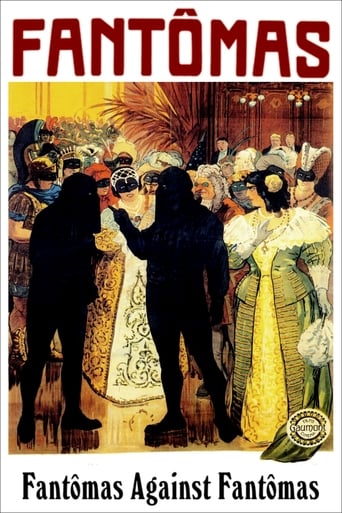ReaderKenka
Let's be realistic.
Huievest
Instead, you get a movie that's enjoyable enough, but leaves you feeling like it could have been much, much more.
Lachlan Coulson
This is a gorgeous movie made by a gorgeous spirit.
Delight
Yes, absolutely, there is fun to be had, as well as many, many things to go boom, all amid an atmospheric urban jungle.
gavin6942
As inspector Juve seems to be unable to put Fantômas (Rene Navarre) behind bars the Press comes up with the idea Juve must be Fantômas himself...Here we get a nice twist in the second half of the series... the idea that Juve is so inept that he must actually be Fantomas (or at the very least in league with him). This creates the odd triangle of good guys, bad guys and the media -- and public opinion is a powerful thing.While part three is probably the highlight of the series, part four is also rather strong and a great continuation. Definitely worth a viewing or three.
Michael_Elliott
Fantomas Against Fantomas (1914) *** (out of 4) Fourth film in the series has Inspector Juve coming under attack by the newspapers because certain editors begin to think that if he can't catch Fantomas it must be because he's actually Fantomas. Juve is thrown in jail where he begins to rot but while inside the real Fantomas sets up his next score and soon the police realize that they've made a mistake. Many fans consider this the best entry in the series and while I found it to be good at the same time it's nowhere near the quality of the previous film. I think the biggest problem is that the story is beginning to get so far-fetched that I'm having a hard time believing some of the "mystery" of the characters and at times things get so confusing that it's rather hard to follow. In this episode the inspector is in prison so Fantomas takes the identity of an American cop and begins to have his crew members arrested. This is a tad bit too out there for my liking but there are still quite a few good moments in the film. One such moment is the second portion of the film dealing with the "bleeding wall", which is one of the better sequences in the series. There's another good bit at a party where at least three possibly versions of Fantomas shows up but after a while this too just adds to the confusion. Navarre and Breon keep up their fine work as Fantomas and Juve as both are certainly very comfortable in their roles by this point. Georges Melchior appears briefly as Fandor and he too is in good form. Feuillade doesn't have much style once again but he at least keeps the film moving well as the 60-minute running time goes by without any glitches.
dbdumonteil
It's actually the third episode ("Le Mort Qui Tue") which walks away with the honors.In "Le Policier Apache" ,the writers ' talent began to dry up and Fantomas with his gang of "Apaches" (=ruffians)began to lose its mystery.A fragment of the film was lost and replaced by a short scene taken from another movie (an asterisk signals the editing ,at least on my copy).Juve ,whose part was smaller and smaller,as the movies went by,is arrested at the beginning of the movie,the authorities (how dumb they were!)mistaking him for Fantomas !His good buddy,journalist Fandor ,makes off as he knows it 'll be his turn next time.So,like in "Le Mort Qui Tue" it's Fandor going solo ,except for the final where he is joined by Juve who could finally prove his innocence.The best scene is Lady Beltham' s(now married again and known as Princess Alexandra)fancy dress ball where three Fantomas are among the guests .
vostf
...just above the previous episode: Le Mort qui tue (1913). Louis Feuillade's narrative mastery greatly improved after the first adventure of the "Emperor of Crime."Fantômas vs. Fantômas is a perfect balance between mystery, action and surreal/visual poetry. Just think of the bleeding wall and the fancy dress ball.The ultimate episode, Le Faux Magistrat (1914), is more of a classical crime story. Fantômas' P.O.V. is widely over-used and action takes place in a little town instead of Paris.By 1914 Fritz Lang was a painter in Montmartre. He obviously learned a lot from the serial. Especially how cinema could bring together art and entertainment. He then gave us Mabuse, the "Crime Genius", a more serious and tragic character than Fantômas and, above all, a major step-stone in cinema history.

